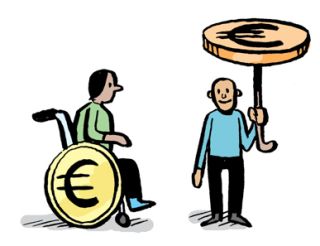The Cost of Disability in Ireland

The Cost of Disability in Ireland – Final Report has been published by the Department of Social Protection. This detail of this study, which commenced in 2019, is very welcome and should inform policy on a cost of disability payment in the near term.
Overall, although those not at work due to illness or a disability only account for a small proportion of those in poverty, their experience of poverty is high. Social Justice Ireland believes there is an on-going need for targeted policies to assist them. These include job creation, retraining and further increases in social welfare supports including the introduction of a cost of disability payment.
The Cost of Disability in Ireland: main findings
1. There are significant additional costs faced by individuals with a disability which are currently not met by existing programmes or by social welfare payments. The analysis shows that the actual costs faced by individuals will severe disabilities on average range from €9,600 - €12,300 per annum and for those with limited disabilities from €8,700 - €10,000 per annum.
2. In addition to the additional costs incurred by individuals with a disability, there are unmet costs faced by many as they are not currently affordable.
3. Individuals with a disability face enormous challenges in living independently and face a high risk of poverty and social exclusion.
4. Measures to address the additional costs of disability should be based on a multifaceted approach involving increased cash payments, enhanced access to service provision and specific targeted grant programmes.
5. Individuals with a disability experience significant challenges in accessing employment. A high priority should be given to facilitating an increase in employment opportunities for individuals with disabilities.
6. Concentration of any additional supports should be targeted on those most in need and who face the greatest additional costs of disability. This would be more effective in meeting policy objectives and in enhancing value for money than in introducing additional small scale supports for those who face minor additional costs of disability.
7. The levels of disability payments and allowances should be changed to reflect the very different costs of disability by severity and type of disability.
8. There is a need to recognise the impact on families of individuals with a disability and in particular, the loss of earnings and sacrifices made by families in caring for those most in need.
9. In designing supports for individuals with disabilities, the focus should always be on the needs of the individuals and their families.
10. Ongoing monitoring and evaluation of supports should take place to ensure the best use of scarce resources.
Indecon estimates of the overall average annual costs of disability in Ireland ranges from €9,482 per annum to €11,734. The analysis has also shown that extra costs of disability are incurred across a wide range of areas and can include expenditure such as medicines, care and assistance, transport and mobility, costs of social engagement, home adaption, and day-to-day expenses on items like food and heating the home. The extent to which additional costs are incurred depends on the nature of an individual’s disability. It is important to note that these estimates, even those provided at a more granular level of individual disabilities, are average across populations of individuals with potentially different levels of need, different circumstances, and different costs. The survey research has illustrated that within these averages there are likely individuals who face considerably higher costs due to their disability than those estimated below. This suggests that there is a need for the state to provide supports to individuals with disabilities via a range of supports including additional income, targeted grants, and better services or supports free of charge.
The report also finds that ways to increase the probability and opportunities for employment for persons with a disability would also be an important element in securing extra income. This suggests the need for a multi-faceted approach involving measures to support additional income, targeted grants, and better services or supports free of charge. The evidence also demonstrated the low levels of employment among individuals with a disability. Ways to increase the probability and opportunities for employment for persons with a disability would also be an important element in securing extra income.
Policy recommendations
Disability is strongly associated with poverty in Ireland. Among people who are unable to work due to long-standing illness one in three (33.7%) live on an income below the poverty line. Among those who are able to work many people with a disability are unemployed; a classification where more than four in ten are in poverty. Research from the National Disability Authority and the Workplace Relations Commission highlights the challenges people with disabilities have in finding employment and remaining in a job given the daily challenges many face.
There is a very strong case to be made for introducing a non-means tested cost of disability allowance and we welcome recent moves to give greater policy consideration to this issue. This proposal, which has been researched and costed in detail by the National Disability Authority in 2006 and most recently Indecon in 2021 and advocated by Disability Federation of Ireland, would provide an extra weekly payment of between €10 and €40 to somebody living with a disability (calculated on the basis of the severity of their disability). It seems only logical that if people with a disability are to be equal participants in society, the extra costs generated by their disability should not be borne by them alone. Society at large should act to level the playing field by covering those extra but ordinary costs.
It is imperative that the findings of the latest report on the Cost of Disability in Ireland begin to inform policy immediately so that those who bear the extra cost of disability in society are supported both in terms of additional income supports, fully resourced and accessible public services, pathways to employment and other supports.